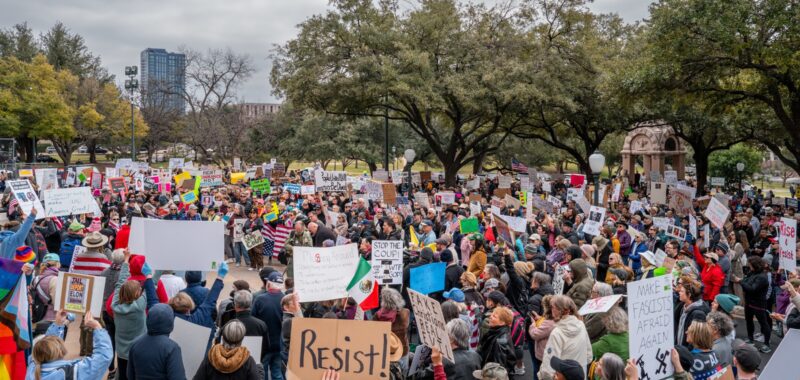Hundreds of artists rebuked the National Endowment for the Arts (NEA) in an open letter this week after the agency imposed new requirements for grant applicants not to operate diversity, equity, and inclusion (DEI) programs or use federal funds to “promote gender ideology.”
The updated compliance standards for applicants come after the NEA canceled its Challenge America grant for “underserved communities” and announced that funding priority would be given to projects that “celebrate and honor” the signing of the Declaration of Independence.
On Tuesday, February 18, 463 artists and cultural workers sent a letter to NEA leadership, as reported by the New York Times, asking the agency to reverse course on its compliance with President Trump’s recent executive orders prohibiting Diversity, Equity, and Inclusion initiatives in federally funded agencies and recognizing only two genders in the federal government.
According to the updated NEA compliance guidelines, organizations submitting a grant application certify that they will provide records of their compliance with executive orders in addition to preexisting NEA requirements, including adherence to acts prohibiting age and disability discrimination.
An NEA spokesperson has not yet responded to several inquiries.
In response to Hyperallergic’s request for a signatory list, theater director and 2019 MacArthur Fellowship recipient Annie Dorsen said the list was private. In a document obtained by Hyperallergic, artists said they elected to be anonymous because they felt the letter would be “stronger without specific authors attached.”
Among the artists who have publicly stated their participation in the missive is performance artist Holly Hughes, a member of the group known as the NEA Four. In 1990, the NEA revoked Hughes’s and three other artists’ grants after Congress passed a “decency” clause that allowed it to reject applications based on subject matter. The artists, the majority of whom belonged to the LGBTQ+ community, then sued the NEA in a case ending at the Supreme Court, where justices upheld the clause.
“The attacks on artists occurred then, as now, in a very censorious moment with a national freak out about the popularity of hip hop, and restrictions on the dissemination of information about reproductive services and safer sex information,” Hughes told Hyperallergic.
In Tuesday’s letter, artists accused the agency of abandoning its mission to “foster and sustain an environment in which the arts benefit everyone in the United States” and asked it to reverse its current requirements and refuse similar future restrictions. The undersigned also accused the institution of “conforming to Trump’s reactionary and discriminatory executive orders.”
“Artists are not in the business of promoting ideology (whatever that means),” the letter reads. “We are compelled to tell our truths, to create community around the stories that give life to those truths, and to make common cause with others while we share this time on earth.”
Hours after the artists sent the letter to NEA officials, the agency held a prescheduled webinar on the contested new guidelines during which Michelle Hoffman, director of Arts Education for the NEA, said that compliance requirements for federal funding have existed for decades.
“All applicants for federal funds must sign an Assurance of Compliance,” Hoffman said.
Hoffman said the Challenge America was rolled into its Grants for Arts Projects Programs as a matter of efficiency, but later added, “In accordance with executive orders, we will not fund projects that include DEI activities.”
Addressing the focus of the 250th anniversary of the Declaration of Independence projects to the new guidelines, Hoffman said the NEA had already partnered with Congress on special projects in 2016 under the Obama administration. A sentence stating that these projects would be given funding priority has since been removed from the NEA’s website.
Hoffman did not explain why eligibility for organizations applying for Grants for Arts Projects increased from three years of arts programming to five years.
While Hoffman said that requiring compliance with federal policy is a well-established practice for grantmaking agencies, the open letter signatories said the NEA had made a “short-sighted decision” to conform with orders that have the potential to be negated on constitutional grounds.
“The two targets of these restrictions: queer and trans artists, and the much broader overlapping communities signified by anti-DEI language, are being targeted in all aspects of public funding,” Hughes told Hyperallergic.

